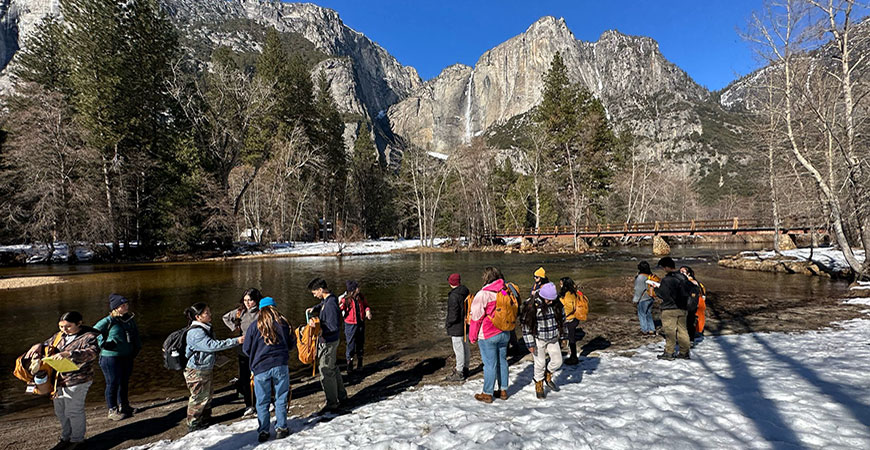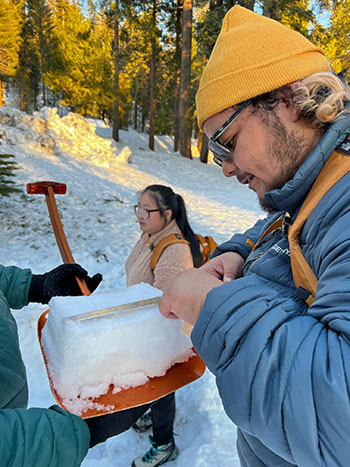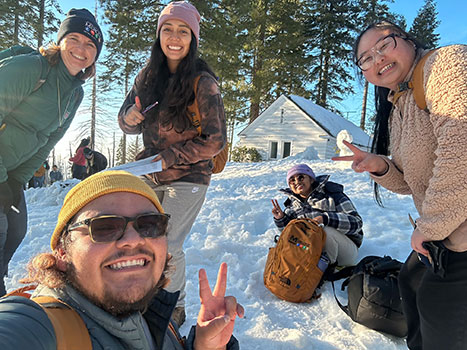
When Carlos Martinez was growing up in Southern California, his experience outdoors largely consisted of the irrigated lawns and tidy trees of his local park. Camping and hiking were not in his family’s recreational repertoire. Meanwhile, high school and work kept him too busy to focus on much else.
Martinez’s diligence paid off with an offer of admission to UC Merced. Like all undergraduate biological sciences majors, he completed more than a few laboratory classes involving pipettes and test tubes.
“I was not completely sure what I wanted to do after I graduated. I just knew that I did not want to sit behind a lab bench for the rest of my life,” Martinez said.
In search of an alternative path, Martinez went to an event sponsored by the campus’s Undergraduate Research Opportunities Center. That’s where he learned about ¿field curious?.
 Sponsored by the UC Merced Natural Reserve System (NRS), ¿field curious? introduces undergraduates to field research during a weekend stay at an NRS reserve. The program is designed to lower the barriers preventing many students, especially first-generation college attendees and those from minority backgrounds, from giving field research a try.
Sponsored by the UC Merced Natural Reserve System (NRS), ¿field curious? introduces undergraduates to field research during a weekend stay at an NRS reserve. The program is designed to lower the barriers preventing many students, especially first-generation college attendees and those from minority backgrounds, from giving field research a try.
“There wasn’t a big commitment. It wasn’t like something I had to take a lot of time away from school for,” Martinez said. “I thought, even if I don’t like it as a career, I can also have fun over the weekend.” He signed up for the Fall 2023 cohort on the spot.
Martinez’s reaction — why not? — was exactly the response that ¿field curious? leader Jessica Malisch was hoping for. With her colleagues, the NRS director spent the previous year identifying what makes some students balk at field research opportunities and figuring out ways to remove the hurdles.
The need for the program became obvious to Malisch in 2021, when the NRS began offering the Swarth Fogel NRS Undergraduate Research Scholarship. Of the more than 200 students who began applications, only a handful completed the process. The top reason students listed for not finishing their applications: They didn’t see themselves as field researchers.
Malisch could commiserate.
“As an undergraduate myself, I didn’t feel like I belonged. I didn’t come from a family that was outdoorsy, and I compared myself to students who did; it was intimidating.”
Given that UC Merced is a Hispanic-serving institution where most of the students hail from groups historically marginalized in field research, a large proportion of the student body could be grappling with the same feelings. This problem, Malisch realized, needed intervention.
“How can we help students develop a sense of belonging? If a student has never been camping or hiking, how do we make this a gentle entry into that world?” Malisch asked.
In fall 2022, Malisch gathered her troops to devise a remedy. Those who weighed in included Joy Baccei, director of the NRS’s Merced Vernal Pools and Grassland Reserve; Isabella Sagarra, Baccei’s student assistant; Breezy Jackson, director of the NRS’s Yosemite Field Station; and Citlali Perez Morales, Jackson’s student assistant.
The program the team devised provides students with all the information, equipment and reassurances they and their families might need to say yes to the program.
As a UC Merced undergraduate herself, Perez Morales was the team’s ace in the hole.
“A lot of my role was, if I was a student in the program, what would I want?” she said. “I looked at my lack of experience in the outdoors and knew I wouldn’t have been prepared for the program because I didn’t have items like warm clothes, or great hiking shoes or rain gear.”
Those insights fueled many features of the ¿field curious? program. The program gives participants outdoor gear such as sturdy backpacks, rain-resistant field notebooks, handwarmers and foam pads usable as outdoor seating, all of which they keep once they have completed the program. To eliminate anxieties about camping, students sleep in fully furnished cabins at the NRS’s Yosemite Field Station. The brevity of the program enables busy students with jobs and family responsibilities to squeeze the time into their schedule.
Pre-trip meetings cover information such as when the students will have cell phone service, where bathroom stops are located and potential hazards they might encounter such as chilly temperatures. All trip costs, from transportation to food, are covered by the UC Merced NRS.
Martinez found the pre-trip information invaluable.
“They told us what we should be prepared for. Snow. Cold weather. Hiking. So, I prepared myself to be in that mentality,” he said. He made good use of his backpack too, stashing extra water, socks and snacks “in case of any emergency.”
For a science major like Martinez, the real prize was a chance to participate in actual research. Trip organizers arranged for the group to help Yosemite National Park hydrologist Kat Fong take snow water samples.
“¿field curious” was the first time I experienced snow. I felt like a little kid,” Martinez said. “But when it came to actually collecting data, it was by far one of the most exciting aspects of the trip.”
To measure how much water was in the snow, the group carefully shoveled out cubes of snow and noted their weight. Fong would use these density measurements to estimate the water content of the snow, monitor conditions in the Merced River watershed, and share with NASA to inform estimates of snow water in the Sierra Nevada and Merced River watershed.
Snow sampling will be an opportunity unique to Martinez’s cohort. UC Merced NRS staff ensure that each ¿field curious? group is paired with a different researcher based at one of the campus’s field stations.
After collecting the snow data, the group retired to the Wawona cabins. Together, the 25 team members cooked dinner and got to know one another. Students bonded over their afternoon in the snow, and swapped stories about their different courses of study, which ranged from mechanical engineering to psychology.
The next day, Martinez and his fellow students stopped at the NRS’s Merced Vernal Pools and Grassland Reserve. Trip leaders described how the reserve came to have some of the most ancient soils in North America, and how those soils pool rainwater that supports native species such as tiger salamanders and fairy shrimp. Once at the reserve, some students looked for birds, while others marveled at the endangered fairy shrimp Malisch pointed out in pool waters. Martinez, for his part, hunted for mushrooms in the rain-damp meadows.
To give students a way to build on their ¿field curious? experiences, the UC Merced NRS publishes an online magazine commemorating each cohort’s field experience. Against a dynamic backdrop of photos and videos from the trip, the magazine includes poems and field sketches, and bios of the scientists students meet as part of the program. Other pages describe field opportunities like the Swarth Fogel scholarship and the NRS’s Field Science Fellowship; UC Merced NRS student naturalist training; and contact information for UC Merced faculty open to mentoring students in field research.
The magazine is the brainchild of former UC Merced NRS intern Perez Morales.
Perez Morales designed and produced the first two issues of ¿field curious? magazine, while also fielding participant questions and organizing trip logistics for two program cohorts.
All the while, she said, “I was falling in love with field science too.” Today, she credits her ¿field curious? experience with landing her first job after graduation: administrative officer for the UC NRS Systemwide Office.
Perez Morales is far from the only ¿field curious? success story. One student became a hydrology intern at Yosemite National Park. Others have been hired as near-peer assistants helping to run the program.
Establishing a pipeline to environmental careers has been Malisch’s intention all along.
“This is a workforce development program to meet the sweeping goals of California’s climate needs. We’ll best be able to meet those needs if the workforce pool reflects the demographics of the state. People can work on pressing climate issues in their own communities,” Malisch said.
For designing ¿field curious?, Malisch and her colleagues were recognized in 2023 with an Advancing Equity Award from the Organization of Biological Field Stations.
Their success has alread y caught the attention of funders. This past year, the UC Merced NRS received a UC Climate Action Innovation and Entrepreneurship grant to expand ¿field curious?. At UC Merced, the funding will support eight cohorts of 200 students over the next two years. Half will be open to any undergraduate at UC Merced. The remaining four cohorts will enlist student affinity groups such as AFRO Hall, a residential community for undergraduates within the African diaspora; the Native and Indigenous Student Coalition; LGBTIA students and the Fiat Lux House for first-generation college students.
y caught the attention of funders. This past year, the UC Merced NRS received a UC Climate Action Innovation and Entrepreneurship grant to expand ¿field curious?. At UC Merced, the funding will support eight cohorts of 200 students over the next two years. Half will be open to any undergraduate at UC Merced. The remaining four cohorts will enlist student affinity groups such as AFRO Hall, a residential community for undergraduates within the African diaspora; the Native and Indigenous Student Coalition; LGBTIA students and the Fiat Lux House for first-generation college students.
The grant will also fund the creation of a program template. Such a curriculum could enable ¿field curious? to be adopted by other UC campuses, university systems and other institutions.
“We’re getting frequent requests to learn more about the program. I feel like it has taken over my job now,” said Malisch. But she’s not complaining, because ¿field curious? hits the sweet spot in her professional life. “It has always been my biggest passion to engage undergraduates in field research. I’ve found so much joy in that.”
As for Martinez, he credits ¿field curious? with revitalizing his career plans.
“That little push from ¿field curious? was honestly all it took for me to know that being a field researcher is what I want to do. I love it so much and want to keep doing this as long as I can.”
Now in his third year at UC Merced, he has added an emphasis in ecology and evolution to his major.
He’s also become the program’s biggest cheerleader on campus.
“I talk about it a lot with a ton of students. This is what the program is about. This is what we did. You should sign up right now, so you get a spot. I’m just so excited about the program because of how much of an impact it had on me.”






